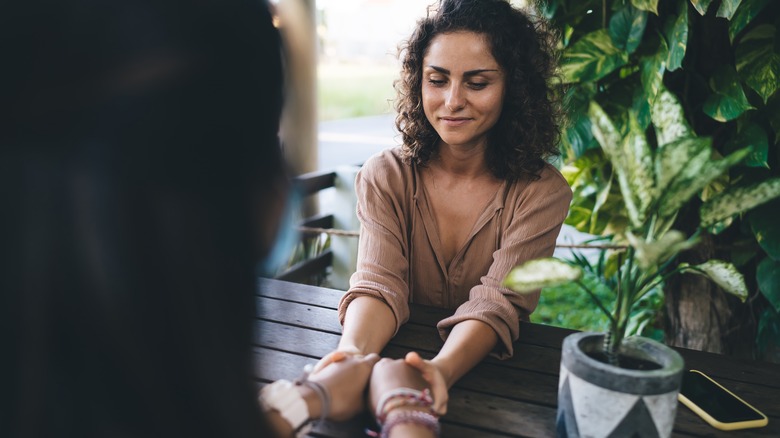The Difference Between Oversharing And Vulnerability In A Relationship
Have you ever been in a situation where you were sitting across from a date at a coffee shop and you ended up telling them a deeply personal story about yourself for no apparent reason? Maybe you were getting uncomfortable with the prolonged silence or you were trying to connect with them. But the exchange left you with a vulnerability hangover and you were feeling weird about opening up. The entire thing was also made worse by the fact that your date wore an uncomfortable expression on their face and was clearly in turmoil about what to say or do next.
The idea of being vulnerable has been encouraged so much in recent times, especially within a romantic relationship, in the hopes of building an authentic connection. And while this is true, there is also such a thing as oversharing. The difference between vulnerability and oversharing lies in the intention behind why you open up and what you expect from your listener. With vulnerability, you're sharing from an authentic and genuine place, but with oversharing, you're expecting connection from a relationship that has likely not gotten to that place yet.
Professor and author Brené Brown, who's discussed vulnerability extensively in her work, had this to say about oversharing vs vulnerability. "Oversharing is not vulnerability. In fact, it often results in disconnection, distrust, and disengagement," she noted in her book, "Daring Greatly: How the Courage to Be Vulnerable Transforms the Way We Live, Love, Parent, and Lead" (via Becoming Who You Are).
Oversharing could be a sign of anxiety or poor boundaries
The line between the two might be hard to see but there is one. Psychotherapist Israa Nasir posted about the difference on Instagram, writing, "Using oversharing to get closer to someone is an unintended and non-malicious emotional manipulation, or a sign of poor boundaries. It can leave you feeling empty and lonelier than before. It can also push the other person away, by overwhelming them with information that doesn't match the level of connection."
You may know from experience that oversharing is something you should avoid doing in a new relationship, one in which a mutual level of intimacy, familiarity, or trust hasn't been reached yet. But this isn't reserved for romantic unions alone. In fact, platonic relationships, especially ones that are just starting out, can stand to benefit from this important distinction too. When you overshare, you could be operating from a place of anxiety induced by awkward silence or as a desperate attempt to relate, according to Nasir. "Sometimes, oversharing can also be a form of 'venting' or 'emotional dumping,' which can be emotionally exhausting for the other person," she added.
With vulnerability, the sharing feels authentic and freeing. You open up because you feel a genuine desire to do so. There is no underlying intention behind it. And this is what leads to true intimacy. As Brown shared in her book, "Using vulnerability is not the same thing as being vulnerable; it's the opposite — it's armour."
How to stop oversharing and lean into vulnerability
As with most things, it's good to check in with yourself before you share something with someone. Yes, being more vulnerable with your partner is essential in a healthy relationship, but this doesn't mean you have to force yourself to say something on the first date, especially if the reason you're doing so is any of what we discussed above. Ask yourself some important questions. What am I hoping to achieve by sharing this information? Will I be hurt if the other person doesn't respond in the way I'm expecting them to? Am I just trying to fill the uncomfortable silence by saying this?
It is also important to realize that all of us have different comfortability levels when it comes to sharing and receiving what others share. As author Hannah Braime wrote at Becoming Who You Are, "We all have different personal boundaries and comfort levels, so what feels appropriate to one person might not to another. Some people feel fine diving straight into the deep stuff while other people take a while to warm up before they feel comfortable sharing more personal information." Getting a feel for this distinction before you share something could be helpful too.
There is nothing wrong with desiring deeper connection in your relationships. Just make sure you're sharing things because you really want to and that you're doing so from a self-assured and freeing place. Not with an underlying intention.


